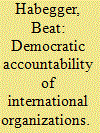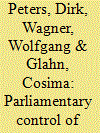| Srl | Item |
| 1 |
ID:
097794


|
|
|
|
|
| Publication |
2010.
|
| Summary/Abstract |
Many international organizations, including the United Nations, are accused of lacking democratic accountability. A variety of proposals have been made to close the gap between their extended influence and the lack of effective controlling mechanisms to prevent abuses of power. This article focuses on one specific proposal: the establishment of parliamentary assemblies. Based on the experiences of the Council of Europe and the Organization for Security and Cooperation in Europe, it presents the factors that enable such assemblies to exercise parliamentary control and influence towards intergovernmental decision-making bodies.The article shows how a parliamentary dimension can be introduced conceptually into the debate on the democratic accountability of international organizations and how these insights support the reflections on a United Nations parliamentary assembly.
|
|
|
|
|
|
|
|
|
|
|
|
|
|
|
|
| 2 |
ID:
134065


|
|
|
|
|
| Publication |
2014.
|
| Summary/Abstract |
Parliamentary involvement remains a key tool for the democratic control of executive policies. This article explores the web of parliamentary involvement in decision-making on European Union (EU) military operations, using insights gained in an in-depth case study on the EU's anti-piracy mission Atalanta. We find that parliaments at all levels became involved only after key political decisions had already been made. At the member state level, we find highly uneven involvement with only some parliaments being very well informed and closely monitoring, if not influencing government policy. The European Parliament became active only after the launch of the mission but then scrutinised it intensely, profiting (in contrast to national parliaments) from its access to top military officials and key decision-makers. Finally, transnational parliamentary assemblies as well as more informal networks provided opportunities to transmit information across the boundaries of individual parliaments and party-groups thus potentially enhancing the ability of parliamentarians to scrutinise government policies.
|
|
|
|
|
|
|
|
|
|
|
|
|
|
|
|
| 3 |
ID:
087569


|
|
|
|
|
| Publication |
2009.
|
| Summary/Abstract |
Why do some democracies break their security commitments whereas others do not? This study proposes a research strategy to answer the question by analyzing the timing of unilateral exits from a coalition military operation. Coalition participants typically do not exit until a military mission has been accomplished. However, in the case of the US-led coalition occupying Iraq since May 2003, 16 states have unilaterally withdrawn their armed forces. Despite the danger such defections may cause to the relationship of these states with the USA, why and when do they exit? The author creates a dataset with a state-month unit of analysis that contains information on 37 partner states and applies a Cox proportional hazard model. The study finds that the occurrence of a national election serves as a strong driving force to accelerate an exit from the coalition. An incumbent leader who faces a challenger who opposes military contributions in Iraq would reverse the policy to support the USA and exit the coalition to win an election, even at the risk of damaging a bilateral relationship with the USA. A change in leadership after an election, on the other hand, failed to be a predictor of the timing of defection. Furthermore, results reveal that the division of power within the government and the constitutional rules that enable significant parliamentary control over executive decisions to use force neither delay nor accelerate the timing of withdrawal. To understand the conditions under which democracies break their security commitments, more attention should be paid to election cycles than to a change in leadership and to types of democratic institutional and constitutional arrangements
|
|
|
|
|
|
|
|
|
|
|
|
|
|
|
|